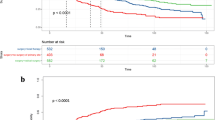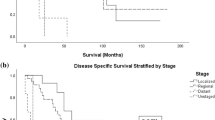Abstract
Purpose
To evaluate risk factors for survival in a large international cohort of patients with primary urethral cancer (PUC).
Methods
A series of 154 patients (109 men, 45 women) were diagnosed with PUC in ten referral centers between 1993 and 2012. Kaplan–Meier analysis with log-rank test was used to investigate various potential prognostic factors for recurrence-free (RFS) and overall survival (OS). Multivariate models were constructed to evaluate independent risk factors for recurrence and death.
Results
Median age at definitive treatment was 66 years (IQR 58–76). Histology was urothelial carcinoma in 72 (47 %), squamous cell carcinoma in 46 (30 %), adenocarcinoma in 17 (11 %), and mixed and other histology in 11 (7 %) and nine (6 %), respectively. A high degree of concordance between clinical and pathologic nodal staging (cN+/cN0 vs. pN+/pN0; p < 0.001) was noted. For clinical nodal staging, the corresponding sensitivity, specificity, and overall accuracy for predicting pathologic nodal stage were 92.8, 92.3, and 92.4 %, respectively. In multivariable Cox-regression analysis for patients staged cM0 at initial diagnosis, RFS was significantly associated with clinical nodal stage (p < 0.001), tumor location (p < 0.001), and age (p = 0.001), whereas clinical nodal stage was the only independent predictor for OS (p = 0.026).
Conclusions
These data suggest that clinical nodal stage is a critical parameter for outcomes in PUC.
Similar content being viewed by others
References
Visser O, Adolfsson J, Rossi S et al (2011) The RARECARE working group. incidence and survival of rare urogenital cancers in Europe. Eur J Cancer 48:456–464. doi:10.1016/j.ejca.2011.10.031
Swartz MA, Porter M, Lin DW, Weiss NS (2006) Incidence of primary urethral carcinoma in the United States. Urology 68:1164–1168
Gakis G, Witjes JA, Compérat E et al (2013) EAU guidelines on primary urethral carcinoma. Eur Urol. doi:10.1016/j.eururo.2013.03.044
Sobin LH, Wittekind C (2002) TNM classification of malignant tumors, 6th edn. Wiley-Liss, New York
Shim JW, Cho K, Choi YD et al (2008) Diagnostic algorithm for papillary urothelial tumors in the urinary bladder. Virchows Arch 452:353–362
Rink M, Fajkovic H, Cha EK et al (2012) Death certificates are valid for the determination of cause of death in patients with upper and lower tract urothelial carcinoma. Eur Urol 61:854–855
Derksen JW, Visser O, de la Rivière GB, Meuleman EJ, Heldeweg EA, Lagerveld BW (2012) Primary urethral carcinoma in females: an epidemiologic study on demographical factors, histological types, tumour stage and survival. World J Urol 31:147–153
Rabbani F (2011) Prognostic factors in male urethral cancer. Cancer 117:2426–2434
Gourtsoyianni S, Hudolin T, Sala E, Goldman D, Bochner BH, Hricak H (2011) MRI at the completion of chemoradiotherapy can accurately evaluate the extent of disease in women with advanced urethral carcinoma undergoing anterior pelvic exenteration. Clin Radiol 66:1072–1078
Gakis G, Witjes JA, Comperat E et al (2015) Guidelines on primary urethral carcinoma. In: European association of urology (ed) EAU Guidelines Office, Arnhem, pp 1–14
Champ CE, Hegarty SE, Shen X et al (2012) Prognostic factors and outcomes after definitive treatment of female urethral cancer: a population-based analysis. Urology 80:374–381
Gakis G, Morgan TM, Daneshmand S et al (2015) Impact of perioperative chemotherapy on survival in patients with advanced primary urethral cancer. Results of the international collaboration on primary urethral carcinoma. Ann Oncol. doi:10.1093/annonc/mdv230
Gakis G, Morgan TM, Daneshmand S et al (2015) Impact of salvage surgery and radiotherapy on survival in patients with recurrent primary urethral cancer. J Clin Oncol 33:5s (suppl; abstr 4568)
Conflict of interest
None.
Ethical standard
This is an IRB-approved study conducted according to the Declaration of Helsinki.
Author information
Authors and Affiliations
Corresponding author
Rights and permissions
About this article
Cite this article
Gakis, G., Morgan, T.M., Efstathiou, J.A. et al. Prognostic factors and outcomes in primary urethral cancer: results from the international collaboration on primary urethral carcinoma. World J Urol 34, 97–103 (2016). https://doi.org/10.1007/s00345-015-1583-7
Received:
Accepted:
Published:
Issue Date:
DOI: https://doi.org/10.1007/s00345-015-1583-7




